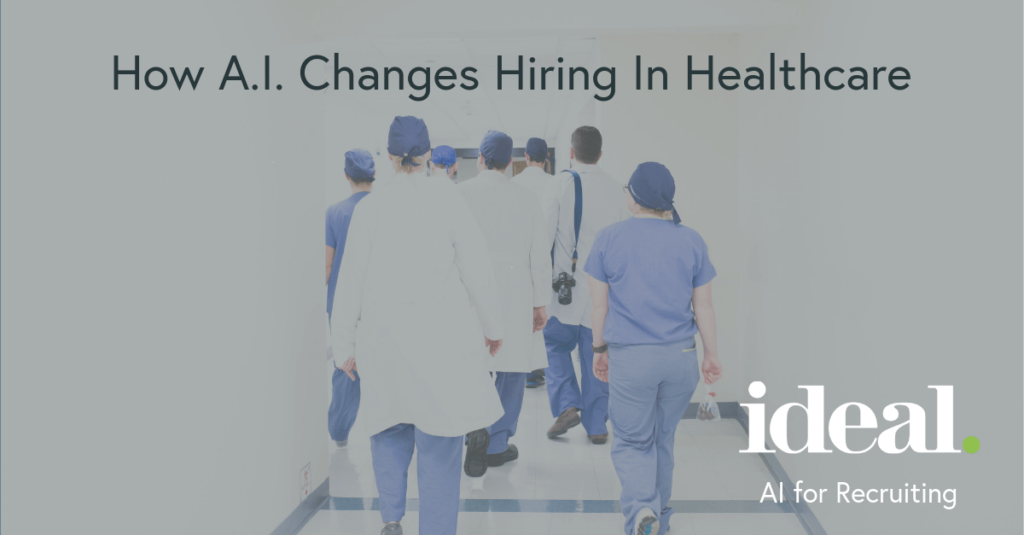Are you looking to make your hiring practice more productive and efficient?

North American healthcare hiring has been decreasing a bit in 2019, which is a potential longer-term problem. Statistically, there is a bigger skills gap in healthcare than in the broader economy, with the United States potentially facing a 122,000 doctor shortage by 2032.
Hiring doctors can be niche, however, because of their extremely-specialized skills. Nurses have a specialized skill set as well, but hiring for them is a bit easier and can be aided with technology even more efficiently. And we need it! The hiring picture on the nursing side isn’t rosy. There will be a nurse shortage in the next decade because of the continued aging of the Baby Boomer population. (This is now being called “The 2030 Problem” by some.) In addition, 40-50% of U.S. registered nurses are going to reach retirement age in the next 36 months.
Consider this New Yorker article on aging from May: In it, the director of MIT’s AgeLab says that with current medical advances, we’re potentially adding 8,000 days — about 21 years — to people’s lives. There are obvious economic repercussions there (will they have enough money saved to live 21 more years?), but there’s massive healthcare hiring repercussions. Those 21 years will see all the ailments and creaks and cracks of typical old age, and every society will need doctors, nurses, and other roles within the healthcare ecosystem to care for that.
This is a challenging picture right now.
What are healthcare organizations doing right now?
Some, like UnitedHealth and CVS, are turning more to remote workers. Some healthcare orgs and hospital systems are experimenting with debt relief programs for nurses, for example:
“Geisinger Health, a system that serves nearly 3 million residents in almost 50 counties in northeastern and central Pennsylvania, urges its nurses to reach out on social media to prospective candidates to promote its bonus and loan offers. Johns Hopkins All Children’s Hospital highlights job opportunities and showcases departments and employees using Facebook Live, McDaniel says. The posts generate a lot of user engagement and are designed to boost the number of submitted applications and hires.”
Talent acquisition professionals in healthcare are more and more worried about the future, but they have some strategies in place. That’s good! And standard “hire better” strategies also work in healthcare, i.e. have a consistent process, have a good employer brand, have a good handle on recruitment marketing spend, etc.
But now we come to the big question: If there’s really a 122,000-doctor shortage in the near future, how can we be more efficient about our healthcare hiring?
This is where technology can help
Some have framed the healthcare gap as a time to hire issue, but that’s only part of it. This is a 12-15 year problem, if not much longer than that. To solve such a long-term problem means you need a consistent strategy and a way to repeatedly execute said strategy.
Apologies for any potential bluntless, but humans are not as good as machines at rote, repeated tasks … and much of top-of-funnel hiring, such as screening nurses, nurse administrators, and similar nursing and even clerical roles, is best left to the machines. (For a good understanding of which recruiting tasks should and should not be left to machines, read this.)
To remember above all: Anything involving automation doesn’t necessarily mean that you, as a recruiter, will lose your job tomorrow. It just means a more effective, time-sensitive, repeatable way of getting the best healthcare professionals. It means you are focusing on targeted, consistent interviews … and the tech is focusing on presenting you the needles in the haystacks that you need to close this nursing gap.
You’re trying to be more efficient and find time value; healthcare is a huge societal aspect, and it’s a big part of our relationships with generations as they age (how comfortable they are, how alert they are, etc.) We need it to be done right, and for that, we need talented people. As a result, healthcare talent acquisition is a massively important space. All the tech helps to do is maximize what can be done in this area.
How Ideal helps
We’ve worked with lots of healthcare organizations, from Ideal Image Medical Spa (which we did a case study on, actually) to one organization in the U.S. that we helped hire 80 new nurses just this spring. If you’d like to know more about how we help healthcare organizations maximize their existing tech stack and recruiters to get the best healthcare talent, let us know!